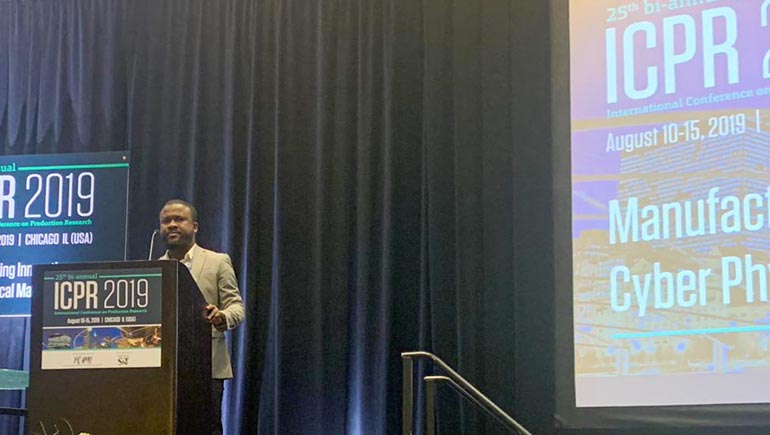Alumni Spotlight: Busayo Aworunse, PhD ’20
Nigeria native earned PhD in industrial and systems engineering while holding down full-time job

Busayo Aworunse, PhD ’20, knows the meaning of the world “hustle.” Earlier this year, he completed his doctoral degree in industrial and systems engineering from the Thomas J. Watson College of Engineering and Applied Science while maintaining a full-time job as a production support engineer for Honeywell International Inc.
Question: What inspired your decision to go back to school for a doctoral degree?
Aworunse: I wanted to move into a different industry. I originally studied natural gas engineering and management. I received my bachelor’s from Obafemi Awolowo University in Nigeria, where I’m originally from. I studied electronic and electrical engineering there and got my master’s in natural gas engineering and management from the University of Oklahoma. I studied that because petroleum is a large industry back in Nigeria, and that’s where I was planning to work.
I got a job here and stayed, but I realized that the oil and gas industry was changing, and I wanted to move on to something more data science-related. It’s hard to switch to something new, so I wanted to get a degree that would open new opportunities for me. I decided that systems engineering would be a perfect blend.
Q: Why did you choose Binghamton University?
Aworunse: When I was searching for degree programs for systems engineering, I came across the SSIE [systems science and industrial engineering] department at Binghamton, and I decided to apply for that program. I spoke with Professor [Mohammad] Khasawneh, the chair of the department, and I had that feeling, that connection. And I thought, “Yeah, that’s where I want to be.”
Q: Where were you working when you decided to back to school? What was your day-to-day like?
Aworunse: After I moved away from gas and oil, my background got me a job at Honeywell in its aerospace division at the facility in South Bend, Ind. I worked in the production support engineering department as the DMAIC (Define, Measure, Analyze, Improve and Control) program lead, where I spent a lot of time working on process improvements. I worked on cost-reduction initiatives and developing extensive road maps through data analytics, as well as making the team more data-driven.
That was when I decided I needed to find a way to bridge my full-time job with getting a degree. I didn’t want to just get a degree for the sake of it — I wanted it to be very applicable to what I was doing at my job.
The asynchronous nature of the program helped. Once I left my job and got back home, I’d move from being a full-time engineer to a full-time student. I’d log into Blackboard and try to catch up on my classes. It was rigorous, no doubt. I’m getting back home and I’m exhausted, but I had the end goal in mind.
Q: What was your experience like at Watson College?
Aworunse: The SSIE program was very valuable for me. It wasn’t something so abstract or theoretical. You know that what you learned in class today is what you’re going to be doing in the office tomorrow. It was something very priceless.
The professors here were also very amazing. In my first semester, I took some statistical class and that’s where I met Professor Jia Deng. I reached out to see if he was taking any doctoral students. Talking with him, I saw his work was more lab-based, and I was also looking for something more simulation-based. So, he referred me to Professor Changquing Chen, and they decided to be my co-advisors. It was a blend of two excellent professors to guide me throughout my journey.
Q: How did you get interested in systems engineering and technology?
Aworunse: As a kid, I was always fascinated with math and physics, and I loved to build things. Growing up, my core focus was wanting to be an engineer — I just didn’t know what kind of engineer I wanted to be yet. In high school, I decided that electrical engineering was the area in which I wanted to complete my undergraduate degree. It gave me a strong background when my career progressed to the oil and gas industry.
Q: What are your goals for the future now that you have your doctorate? Where do you see yourself in the next three to five years?
Aworunse: My degree has definitely given me career progression. It’s made me more marketable. I’d like to keep learning as much as I can. I’m not entirely sure what else I might like doing, but I still want to find myself in process improvements and apply my education to newer areas. The goal is always to improve processes and reduce variation, regardless of what field you’re in.
Q: What do you like to do outside of work?
Aworunse: I like to watch movies, and I play Scrabble and FIFA a lot. I also really love to travel. Back in March, before the shutdowns, I was in India, which was amazing. I’ve also lived in the U.K., Australia and Tunisia. I’ve been to a lot of places for work and for personal trips, including all the continents except Antarctica.
Q: We hear all this talk about “hustle culture” and using every bit of our free time to better ourselves. As someone who’s really lived that life, what advice do you have for others looking to do the same?
Aworunse: Keep the end game in mind. It takes lots of sacrifice, and having the ability to step outside your comfort zone is really important. You have to have that zeal to reach that particular goal. You need to know why you’re doing what you’re doing — it’s what makes you reach the finish line.

